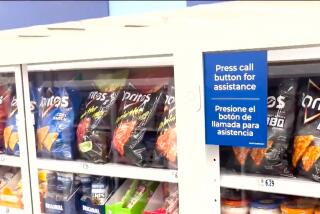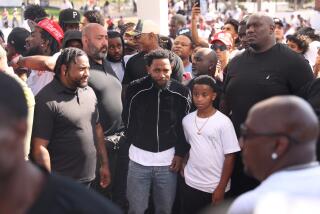One cityâs status quo is another cityâs triumph
This column got its start as a favor to a friend.
Kimberly called me for advice about a month ago. Sheâs a Starbucks exec who travels around the country setting up coffee kiosks in grocery stores, hospitals and retail outlets.
Her boss had asked her to take on a project that would require long hours and a 120-mile daily commute from Porter Ranch to Compton.
She was worried. âItâs so far,â she said. And she wasnât talking just about miles; we both recognized that.
All she knew of Compton was gang killings and gangster rap. Would a middle-aged, suburban white woman -- traveling alone after dark -- have a target on her back?
She asked my advice because my job and interests have taken me to parts of Los Angeles County sheâs never seen. And because almost half the folks in Compton are black, like me.
I might have said, âThat war-zone image is a myth. Comptonâs a struggling community of regular folks who love their kids, work hard at their jobs and deserve a good cup of $3 coffee.â Because, really, thatâs what I believe.
But instead, when she said âCompton,â I groaned -- a reflex, not a considered response. âFill your car with gas before you leave home,â I warned her. âAnd donât stop for anything.â
--
The weekend before Kimberly started her job -- preparing to open a Starbucks inside a new Target store in Compton -- we drove down to the shopping complex and took a mini-tour of the city.
We cruised past parks full of soccer-playing kids and busy check-cashing joints; corner stores and fish markets with âYou buy, We fryâ signs. There were old neighborhoods crowded with tiny houses and new developments with homes so grand we wouldnât have been able to afford them if theyâd been built in Northridge.
It seemed that every house had bars on the windows, a sad commentary on the ever-present fear of crime. But we noticed churches on almost every block, and the few sit-down restaurants we passed were packed with families.
I could feel Kimberly relax. And I felt oddly proud that the city had shown its best side . . . and slightly guilty that Iâd been so quick to express the kind of damning stereotype Iâd complain about if someone else did.
Kimberly would spend the next few weeks âteam-buildingâ with her new baristas. âMy girlsâ she affectionately called the crew of young women from Watts and Compton when she bragged about their work.
--
Three weeks later, I stood in a newly paved parking lot with hundreds of others, celebrating the opening of the Target store at the new Gateway Towne Center, Comptonâs first full-fledged shopping complex.
A high school marching band, choir and majorettes performed. A parade of politicians and developers gave speeches; Target managers wore tuxedos, and a pair of pastors prayed in Spanish and English. âWe deserve this, like any other city,â the English-speaking preacher said, as heads bowed. âThank God for this Target.â
It was a full-on display of a beleaguered cityâs inferiority complex as it tried to compensate with a chest-thumping expression of budding pride.
No longer would Compton take a back seat to nearby Carson, Lakewood and Long Beach.
âNow when they say, âWeâve got a mall,â tell them âSo do we!â â City Councilwoman Barbara Calhoun yelled from the podium, to cheers and applause. âYouâve got a Target? So do we. Youâve got a Home Depot? Well, so do we. And ours has two floors!
âBe proud to be from Compton,â she said, âno matter what anybody says about our city.â
But pride doesnât come easy when your politicians have been so corrupt that a trio of city officials landed in jail. When your community college and public schools have been so badly run, they were shut down or taken over by the state. When outsiders know you only as the murder capital of California, a place where rappers earn bragging rights just for surviving.
âPeople talked bad about Compton for so long . . . the business community wouldnât touch us,â said Mayor Eric Perrodin. Now, he said, the cityâs in the midst of a turnaround.
Two years ago, Los Angeles County Sheriff Lee Baca beefed up patrols in Compton, even though the city couldnât afford to pay for the extra deputies. âI see this as a social responsibility,â Baca told Times reporter Stuart Pfeifer. Now Compton -- which had 65 homicides in 2005 and 39 last year -- is seeing its lowest homicide rate in 20 years.
The business turnaround began in 2004, Perrodin said, when Magic Johnson opened the cityâs first Starbucks. âThat was the first step in saying, âWeâve arrived,â â Perrodin said.
The opening of the shopping center, just off the 91 Freeway on Alameda Street, represents another giant step. The center is expected to generate $2 million in tax revenue and create 1,300 jobs in a city where one-quarter of the nearly 100,000 residents live below the poverty line and the unemployment rate is among the countyâs highest.
The center has a Target, a Home Depot, a Best Buy, a Shoe Pavilion and a 24-Hour Fitness center. Ho-hum stuff in most neighborhoods. But itâs like manna from heaven in a city accustomed to doing without.
âItâs immeasurable what this has done for the psyche of the people of Compton,â the mayor said. âYou take it for granted when you have those things.â
On the same night of the Compton celebration, a grand opening was held in the San Fernando Valley for the newly built Target in Granada Hills. There was no marching band, no thanking God for another place to shop, no politician proclaiming this âA great day for Los Angeles,â as County Supervisor Yvonne B. Burke did in Compton.
But then, there was also no phalanx of law enforcement officers standing guard. On opening night in Compton, deputies were everywhere.
The city knows that in the minds of the public, Comptonâs newfound credibility hangs by a thread. So Mayor Perrodin ended his opening-night speech with an unconventional request -- part warning, part plea.
This is our Target, in our home, he said. If you see trash in the parking lot, pick it up. Be patient with the new employees. And please, no shoplifting.
--
More to Read
Sign up for Essential California
The most important California stories and recommendations in your inbox every morning.
You may occasionally receive promotional content from the Los Angeles Times.










